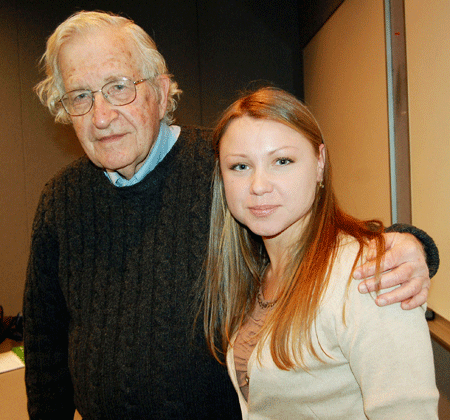Linguist, activist Chomsky visits campus

Students in Emerson Historian-in-Residence Brad Verter’s class were treated to a distinguished guest speaker who has authored more than 100 books and is notable for his work in linguistics, philosophy, and activism: Noam Chomsky.
On November 5, Chomsky, age 83, spoke to students on a range of issues, including foreign policy and the media as well as the presidential election that was to take place the next day.
The scholar had recently returned from a trip to Gaza, where he encountered vibrant university students much like the ones that sat before him in the Emerson classroom. Except for one major difference.
“They’re living a prison,” said Chomsky. “The overwhelming feeling of being under the total control of someone else…is a strange sensation when you’re used to a relatively privileged life.”
Chomsky used the Gaza anecdote to transition into a larger discussion on foreign policy. He noted that the pre-election in Gaza was closely monitored by the United States, and when the people of Gaza voted in a way deemed contrary to U.S. interests, the nation responded by imposing harsh sanctions on the population, said Chomsky.
“Because they voted the ‘wrong way’ in a free election,” Chomsky concluded. “What does that tell you about our government?”
He answered his own question by offering the notion that the U.S. supports democracy across the globe only if it conforms to its foreign policy agenda.
“That ought to be a truism taught in elementary school,” said Chomsky. “They love democracy, but they’re constantly undermining it.”
Chomsky also spoke to students about U.S. democracy, with Election Day approaching. “The country has been driven to the right for the last 30 years,” he said. “The moderate Republicans are the mainstream Democrats, and the liberal Democrats have literally disappeared.”
Chomsky said this is evidenced by the country’s rising poverty levels along with the enrichment of a “tiny fraction” of the population.
“A rich country like this shouldn’t have severe poverty,” said Chomsky.
Noting the prevalence of the “lesser of two evils” rhetoric in this year’s presidential election, students asked Chomsky if there was even a real choice for Americans to pick between on November 6.
“I think there are choices, but the choices aren’t overwhelming,” he responded.
While some of the focus remained on the impending election, Chomsky told students that there are other pressing matters for their generation to focus on.
“There are two problems of the world that are of extreme significance,” he said. “Climate change and the increasing threat of nuclear war.”
Addressing climate change, Chomsky said, “We’re living in kind of a mad house, and we’re dangerous.”
He noted that global warming is a serious problem; its existence and threat most recently evidenced, he said, by Superstorm Sandy, which devastated part of the eastern seaboard and claimed 157 lives.
In a world plagued with problems of nearly every variety, Chomsky offered students some hope for the future in the form of advocating for a more collective society.
“That would mean doing something together,” Chomsky said, and abandoning the prevailing American thought process of “you’ve got to be on your own, you’ve got to take care of yourself.”
Chomsky used stories of his studies and career rich with experience to stress the importance of activism. He concluded his talk by calling upon youth to go beyond their own corner, especially that of a secluded campus environment, and to meet neighbors, make connections, and build community.
Categories